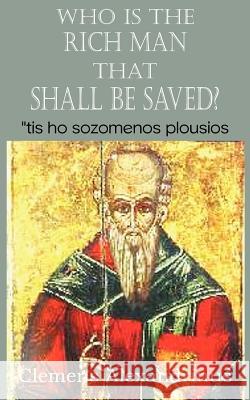Who Is the Rich Man That Shall Be Saved? » książka
Who Is the Rich Man That Shall Be Saved?
ISBN-13: 9781612034317 / Angielski / Miękka / 2012 / 68 str.
Those who are actuated by a love of the truth and love of their brethren, and neither are rudely insolent towards such rich as are called, nor, on the other hand, cringe to them for their own avaricious ends, must first by the word relieve them of their groundless despair, and show with the requisite explanation of the oracles of the Lord that the inheritance of the kingdom of heaven is not quite cut off from them if they obey the commandments; then admonish them that they entertain a causeless fear, and that the Lord gladly receives them, provided they are willing. Let the man who is endowed with worldly wealth reckon that this depends on himself. Clement of Alexandria (Titus Flavius Clemens), was the first member of the Church of Alexandria to be more than a name, and one of its most distinguished teachers. He was born about the middle of the 2nd century, and died between 211 and 216. He united Greek philosophical traditions with Christian doctrine and valued gnosis that with communion for all people could be held by common Christians.
Those who are actuated by a love of the truth and love of their brethren, and neither are rudely insolent towards such rich as are called, nor, on the other hand, cringe to them for their own avaricious ends, must first by the word relieve them of their groundless despair, and show with the requisite explanation of the oracles of the Lord that the inheritance of the kingdom of heaven is not quite cut off from them if they obey the commandments; then admonish them that they entertain a causeless fear, and that the Lord gladly receives them, provided they are willing. Let the man who is endowed with worldly wealth reckon that this depends on himself.Clement of Alexandria (Titus Flavius Clemens), was the first member of the Church of Alexandria to be more than a name, and one of its most distinguished teachers. He was born about the middle of the 2nd century, and died between 211 and 216. He united Greek philosophical traditions with Christian doctrine and valued gnosis that with communion for all people could be held by common Christians.











